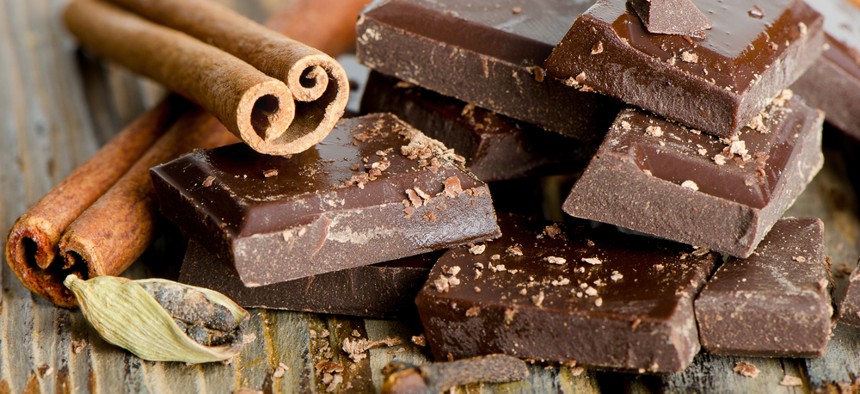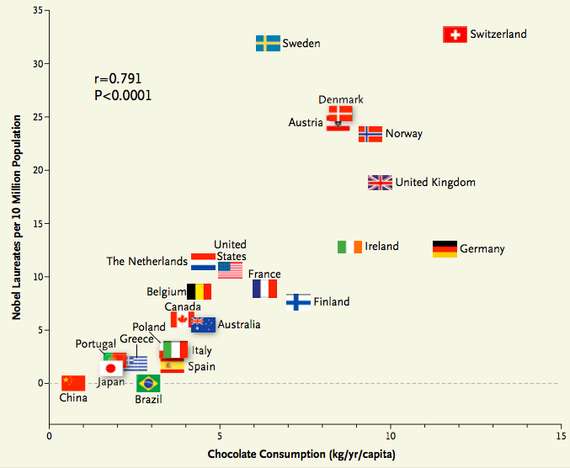
bitt24/Shutterstock.com
Is Chocolate a Superior Memory Food?
Important ties between food and mental functioning keep emerging.
A contentious finding made news last week: People who eat a lot of food that contains trans fats have poorer memories than people who don't. At Scientific Sessions 2014 , a meeting of the American Heart Association in sunny Chicago, doctors announced results of a study that found the link between eating foods high in these specific fats and performing poorly on word-recall tests. It's a loose association, but an important idea.
"Trans fats were most strongly linked to worse memory in young and middle-aged men during their working and career-building years," said lead researcher Beatrice Golomb, a professor of medicine at the University of California San Diego, in a press statement.
Trans fats exist in trace amounts in whole milk and beef, but most are the unnatural spawn of the twentieth-century processed-food movement in the form of partially hydrogenated oils. They are synthesized to turn liquid oils into solid fats with longer shelf lives. Trans fats are the least healthy fatty acid. The Center for Science in the Public Interest has estimated that replacing all the trans fat that comes in partially hydrogenated oils with other fats would save upwards of 10,000 lives a year. Last week's study seems like all the more reason to avoid or ban trans fats. Seems like.
Of course, those diet surveys relied on memory. And other foods might have been causing this association. Could it be that people who eat diets that are high in trans fats are also eating diets that are overall terrible? High in things like sugar or pesticides or plastics or tilapia? Yes, it could. The study accounted for variables like education and depression, which might influence memory—but it didn't account for the rest of what the people eat. It actually only accounted for one other dietary variable outside of trans fats: chocolate.
Why chocolate? Why, chocolate?
Because, Golomb told me, chocolate intake seems to have a link to memory. Her own research has actually shown it. In addition to a 2012 finding that people who eat chocolate more frequently tend to have lower body-mass indices , Golomb has also found that people who eat a lot of chocolate tend to perform better on memory tests .
(Eating omega-3 fats might also improve memory, Golomb told me—something I mentioned in " This Is Your Brain on Fish "—but her current study didn't account for omega-3s.)
The idea is that chocolate has antioxidant effects which improve the functioning of cells that line blood vessels, leading to better blood flow and cell energy, which in turn improves cognition. And Golomb is not alone in championing that idea. The New England Journal of Medicine recently published a novel study that found "a surprisingly powerful correlation between chocolate intake per capita and the number of Nobel laureates in various countries."
Chocolate Consumption and Nobel Laureates

Franz Messerli , a professor of medicine at Columbia University, noted in that study that flavonoids, which are abundant in plant-based diets, have been shown to improve cognitive function. "Specifically, a reduction in the risk of dementia, enhanced performance on some cognitive tests, and improved cognitive function in elderly patients with mild impairment have been associated with a regular intake of flavonoids," wrote Messerli in the journal article. The subclass of flavonoids called flavanols, which are in cocoa, green tea, and red wine, "seems to be effective in slowing down or even reversing the reductions in cognitive performance that occur with aging."
Another study, released last month, found that people who drank a mixture loaded with cocoa flavanols did better on a memory test than people who drank a low-flavanol mix. The older subjects performed at the same level as people two to three decades younger.
Messerli went on to hypothesize that since chocolate consumption has been duly shown to improve cognitive function, "It seems most likely that in a dose-dependent way, chocolate intake provides the abundant fertile ground needed for the sprouting of Nobel laureates." Though, of course, he stipulated, "A second hypothesis, reverse causation—that is, that enhanced cognitive performance could stimulate countrywide chocolate consumption—must also be considered."
A physicist wrote simply, "White chocolate is an obscenity."
Most poignant was the comment of a medicine/physiology laureate: "This has made me wonder if I might have been more successful had I consumed more chocolate."
On the whole, ten laureates (43 percent) reported eating chocolate more than twice a week, compared with only 25 percent of 237 well-educated non-Nobel-laureates. The results were published last summer in the journal Nature .
Since these studies linking chocolate consumption to mental function are based on the understanding of chocolate as an antioxidant that supports cell energy, Golomb decided now to look at trans fats, which have antithetical properties. Since trans fats are prooxidant and induce inflammation (which is linked to worse memory and cognition), Golomb told me by email, "We reasoned that trans fats might be adversely linked to memory."
She explained that both the oxidative stress itself (through effects on proteins, lipids, DNA, and RNA) and inadequate cell energy contribute to cell dysfunction and cell death. Both are linked to worse memory. Inadequate cell energy can lead to "idling neurons" that might be restored with enough energy.
And so, the inflammation induced by trans fats (and reduced by chocolate) may underlie these new memory findings. Even if it's not the trans fats that drove this new correlation, the effect does seem to be due to some dietary factor. So, optimizing one's memory is yet another reason to eat well. I would make a joke here about "brain food," because that seems to be what people do when writing about this sort of research, but I am out of jokes. Maybe I need some chocolate, haha. Is that a joke? People tend to laugh after comments about loving chocolate.
The U.S. Food and Drug Administration has a proposal out now that would remove trans fats from being classified as food altogether, and make them "additives" instead. In recent years many companies have stopped using these oils and eliminated trans fats from products—either voluntarily or by law in places like New York City and California. Public opinion and aversion to products that contain them has led to trans fats all but banning themselves.
"As I tell patients," Golomb said in the press statement last week, "while trans fats increase the shelf life of foods, they reduce the shelf life of people."
I asked if people laugh when she says that. Is anyone confused about the idea of a human's "shelf life?"
"I think they mostly get it," she said.
( Image via bitt24 / Shutterstock.com )






